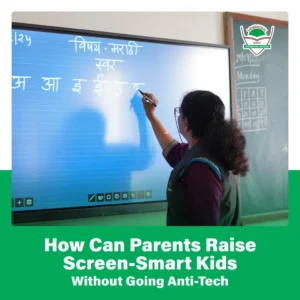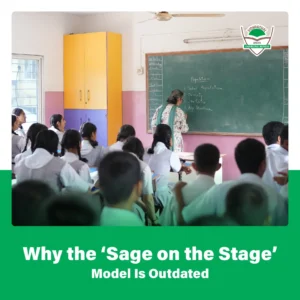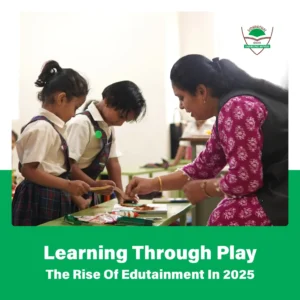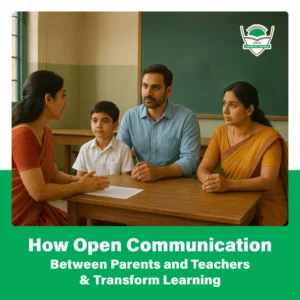As Vidyanchal High School continues to champion holistic education, the National Education Policy (NEP) 2020 has been an ideal companion on this journey. Now, in 2025, the policy’s influence is visible in classrooms across the country—from Delhi to Pune, from metros to semi-urban towns like ours. Here’s how NEP 2020 is transforming the way our students learn, grow, and thrive.
1. Experiential and Multidisciplinary Learning is Now the Norm
NEP 2020 promotes activity-based, project-based, and inquiry-driven learning. Across India, schools have replaced rote methods with storytelling, lab work, group projects, and concept-based modules. In places like Karnataka and Delhi, initiatives such as Nali Kali and the Happiness Curriculum have improved student engagement significantly.
According to Smile Foundation India, this shift helps develop analytical thinking, creativity, and adaptability—skills that go far beyond textbook knowledge.
At VHS, we follow the same principle. Our curriculum integrates science experiments, hands-on math, creative writing, and collaborative classwork—making learning both effective and enjoyable.
2. Multilingualism and Indian Roots are Prioritized
NEP 2020 strongly supports education in the mother tongue or regional language until at least Grade 5. It also encourages celebrating India’s rich linguistic, artistic, and philosophical heritage.
At VHS, students study in English but engage deeply with Marathi and Hindi as second and third languages. Lessons in Indian history, regional folk tales, and classical music connect children to their cultural roots—an approach aligned with the India Education Times overview of NEP’s goals.
3. Skills, Coding, and Life Readiness from Early Grades
Vocational education and skill-based learning—starting from Grade 6—is now part of the core curriculum. NEP 2020 emphasizes coding, critical thinking, problem-solving, and practical life skills.
By 2025, according to St. Wilfred’s School, over 50% of learners in secondary school have experience with robotics, entrepreneurship, or digital projects.
At VHS, children explore basic coding, design thinking challenges, eco-friendly craft projects, and financial literacy activities. These skills prepare them not just for jobs of today—but careers that haven’t been invented yet.
4. Exams Are Being Replaced with Holistic Progress
Gone are the days when a student’s entire year rested on one exam. NEP 2020 replaces that with Formative Assessments, School-Based Assessments, and Holistic Progress Cards that include emotional, social, and creative growth.
A Kashmir Reader article explains how this shift helps reduce exam stress and motivates continuous learning.
At Vidyanchal High School, our assessment system includes feedback from teachers, parents, and peers. It celebrates curiosity, cooperation, discipline, and sportsmanship along with academics—helping build confidence and intrinsic motivation.
5. Technology Is Not Optional—It’s Essential
NEP 2020 accelerated digitally enabled learning across the country. Platforms like DIKSHA and SWAYAM now support over 50 million learners, while classrooms increasingly adopt smartboards, virtual labs, and interactive learning tools.
According to Admission Panel, hybrid learning has become a defining feature of modern schooling.
VHS uses smart classrooms, online modules, simulations, and educational videos to complement textbook lessons. Even homework sometimes happens in the cloud—where students reflect on what they learned in class via digital journals or interactive quizzes.
Bonus: Sports and Physical Education as a Core Component
NEP 2020 reinforces the importance of co-curricular education, especially sports and fitness. The Times of India reports how CISCE now uses portals to monitor student fitness, nutrition, and wellness.
At VHS, physical education is non-negotiable. Students play football, basketball, and cricket regularly. They also participate in skating, yoga, and intra-school competitions. For us, sports aren’t extra—they’re essential to building leadership, discipline, and mental health.
Real Transformation Across Indian Classrooms
The results of NEP’s changes are showing. The Gujarat government’s Gunotsav initiative saw a 180% increase in A and A+ rated schools between 2020 and 2024 after incorporating self-assessment and community review.
Meanwhile, Odisha’s CAMaL Ka Camp used singing, dancing, and storytelling to boost literacy outcomes in over 55,000 rural students (Times of India).
Vidyanchal’s NEP-Aligned Classroom Today
| NEP 2020 Principle | VHS Practice |
| Multidisciplinary Learning | Creative writing, design thinking, science labs |
| Language & Culture | English + Marathi + Hindi + Indian tradition-based content |
| Skills & Vocational Focus | Coding, crafts, eco projects, financial literacy |
| Formative Evaluation | Holistic report cards and value-based assessment |
| Hybrid & Digital Integration | Smartboards, online learning, virtual labs |
| Physical Wellbeing | Sports, yoga, health tracking |
The Bigger Picture
As NEP 2020 reshapes education nationwide, Vidyanchal High School is not just adapting—it’s thriving. The policy’s vision of “education for life, not just for exams” reflects exactly what VHS has always believed: teaching students to be confident, compassionate, and capable.
The classrooms of 2025 don’t just prepare children for a known future—they prepare them for an evolving world. And at Vidyanchal, we’re proud to be at the forefront of this transformation.














